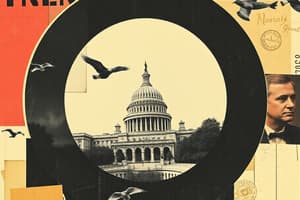Podcast
Questions and Answers
What is the primary goal of fiscal policy?
What is the primary goal of fiscal policy?
- To reduce government spending
- To stimulate economic growth and keep inflation low (correct)
- To increase the trade deficit
- To reduce exports
What is aggregate demand (AD) equal to?
What is aggregate demand (AD) equal to?
- C - I - G - (X-M)
- C / I / G / (X-M)
- C + I + G + (X+M)
- C + I + G + (X-M) (correct)
What is the purpose of fiscal policy in a period of recession?
What is the purpose of fiscal policy in a period of recession?
- To reduce exports
- To stimulate economic growth (correct)
- To reduce government spending
- To increase inflation
What is investment (I) in the context of aggregate demand?
What is investment (I) in the context of aggregate demand?
What is the term for exports minus imports?
What is the term for exports minus imports?
What is fiscal policy often utilized alongside?
What is fiscal policy often utilized alongside?
What are the three categories of fiscal policy?
What are the three categories of fiscal policy?
What is the formula for calculating aggregate demand?
What is the formula for calculating aggregate demand?
What is the main principle of Keynesian economics?
What is the main principle of Keynesian economics?
What is the formula for aggregate demand according to Keynesian economics?
What is the formula for aggregate demand according to Keynesian economics?
What is the result of insufficient aggregate demand, according to Keynes?
What is the result of insufficient aggregate demand, according to Keynes?
What is the purpose of fiscal policy?
What is the purpose of fiscal policy?
What is Say's Law?
What is Say's Law?
What are the four factors that comprise the output of goods and services of an economy?
What are the four factors that comprise the output of goods and services of an economy?
What is the result of strong forces during a recession?
What is the result of strong forces during a recession?
What was the limitation of the existing economy theory before Keynesian economics?
What was the limitation of the existing economy theory before Keynesian economics?
What is the consequence of a contraction in consumer spending?
What is the consequence of a contraction in consumer spending?
What is the purpose of state intervention in Keynesian economics?
What is the purpose of state intervention in Keynesian economics?
What is the effect of an increase in government spending on output?
What is the effect of an increase in government spending on output?
What is the characteristic of prices in Keynesian economics?
What is the characteristic of prices in Keynesian economics?
What is the result of a one-dollar increase in government spending if the fiscal multiplier is greater than one?
What is the result of a one-dollar increase in government spending if the fiscal multiplier is greater than one?
What is the concept that describes the proportional change in output in response to a change in spending?
What is the concept that describes the proportional change in output in response to a change in spending?
Flashcards are hidden until you start studying
Study Notes
Fiscal Policy Definition and Importance
- Fiscal policy involves changing government taxation and spending to influence aggregate demand and economic activity.
- The goal of fiscal policy is to stimulate economic growth, keep inflation low, and stabilize economic growth, avoiding a boom-and-bust cycle.
Fiscal Policy Components
- Three categories of fiscal policy:
- Government purchases of goods and services
- Taxation policies
- Transfer payments (e.g., unemployment compensation, social security benefits, welfare payments)
Keynesian Economics
- Keynesian economics argues that government intervention is necessary to achieve economic stability.
- Before Keynesian economics, existing economic theory failed to explain the Great Depression of the 1930s.
- Keynes argued that free markets lack self-balancing mechanisms to produce full employment.
Aggregate Demand and Its Components
- Aggregate Demand (AD) = Consumption (C) + Investment (I) + Government Purchases (G) + Net Exports (X-M)
- Components of AD:
- Consumption (C): household purchases
- Investment (I): business spending on new machines or equipment
- Government Purchases (G): government spending
- Net Exports (X-M): exports minus imports
Fiscal Policy and the Keynesian Multiplier
- Increasing government spending, while holding other components constant, will increase output.
- The fiscal multiplier effect: changes in output are proportional to a multiple of the increase or decrease in spending.
- A one-dollar increase in government spending can result in a magnitude increase in output if the fiscal multiplier is greater than one.
Studying That Suits You
Use AI to generate personalized quizzes and flashcards to suit your learning preferences.





